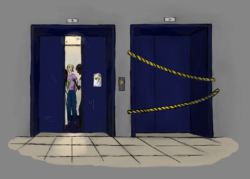Growing up in an evangelical Christian household and attending a fundamentalist Christian high school, charity and service were held next to godliness. Each year our school sent off groups of students to preach the gospel and do charity work. Whether in Thailand, the Dominican Republic, or South Africa, we had God’s work to do—charity wasn’t a suggestion, it was a command.
To aid us in this imperative, our school worked closely with local San Diego missionaries who were doing inspiring work building houses in Mexico or spreading literacy in Mauritania. Usually after a brief video showing starving babies covered in flies, these missionaries would teach us the tools of the trade—mosquito nets, ministry, and moral absolutism. One of these motivational speakers was a young man named Jason Russell, founder of Invisible Children and the filmmaker behind the Kony 2012 viral video that blew up this March and has been viewed over 100 million times since.
I remember seeing Russell speak for the first time as a brace-faced, bespectacled seventh grader. Just by buying an Invisible Children bracelet and spreading my awareness to others, Russell preached that I could make a difference. To a prepubescent boy, this message of empowerment was enticing, and I quickly caught the charity bug.
Throughout middle and high school I built a total of 16 shoddy houses in Tijuana, Mexico, regularly volunteered at a soup kitchen, raised money by fasting in solidarity with those suffering in famines, and went to Waco, Texas, to participate in a poverty simulation so I could understand what it was like to be homeless. I’d been given so much, how could I not share my blessings with the world?
When I watched the Kony 2012 video this March, however, I felt an unfamiliar rush of emotions—uneasiness, skepticism, and even disgust. With an SFS-educated lexicon now tooled with 10-cent phrases like “cultural imperialism” and “white savior industrial complex,” this time I was quick to realize how films like Kony 2012 simplified complex sectarian strife in sub-Saharan Africa, marginalized regional voices, and cast Africans as helpless victims of “evil” men. I was frustrated as I attempted to reconcile these ideas with my wonder-filled seventh-grade self, who had been enamored by similar videos not too long ago.
Looking back on my service experiences I was haunted by a sea of questions. Had all of my hours spent in the hot Mexican sun building homes been spent in an effort to exert my cultural, religious, and intellectual superiority over the economically disenfranchised? Was my work with the black homeless population in Waco based on some racist notion that minorities aren’t good enough to help themselves? Were all of my service hours wasted on harboring up happy emotions of self-fulfillment with no regard for the wellbeing of others or sensitivity to native culture?
Having the dualistic identity of a top-tier liberal arts university and a religiously affiliated body dedicated to holistic service of the global community, Georgetown is an institutional manifestation of the conflict between Russell’s emotionally compelling narrative and my cerebral analysis of the issues that plague development in the third world. A Georgetown education placates the conflict by marrying passion for the others with intelligent solutions for helping those that people. So how do we address campaigns with all the right intentions that miss the mark policy-wise?
For starters, there’s nothing wrong with empathy, compassion, or heartbreak. Jason Russell is no political scientist, aid economist, or historian. He is a man who saw tragedy and cared. But after the release of Kony 2012, Russell was bombarded with relentless criticism from the media and academia for his simplicity, naiveté, and stupidity. The backlash drove Russell into a psychotic state that involved a naked public breakdown and hospitalization in a mental facility.
Instead of disparaging young people for misunderstanding the rational choice theory behind authoritarianism or confusing Idi Amin with Elliot Yamin, we ought to be figuring out how to channel that passion for those less fortunate into something productive. While buying a bracelet in solidarity with child soldiers may be a misguided way to stop African warlords, the sympathy behind that purchase is pure.
The problem is that academia and the media disregard the youth, choosing instead to market their superior intellect on development and aid to elites. This is a mistake. If the Kony 2012 phenomenon has taught us anything, it’s that millennials, and not just those in America’s top universities, sincerely care about the poor, the oppressed, and the disenfranchised and that those feelings can spur them to act. Hopefully the next viral video to permeate the Twittersphere will come from the intelligentsia, and forward a development or humanitarian mission that actually makes a difference.




